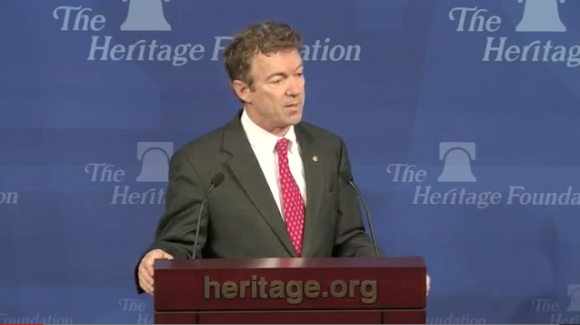
Colin Dueck, writing in Foreign Affairs, argues that Rand Paul’s foreign policy does not seem to be on the ascendency, as some have assessed. Not only does the GOP establishment oppose Paul’s less interventionist take on national security policy, but even the supposedly Tea Party leaning Republican base (essential in any 2016 presidential campaign scenario) is hawkish at its core.
Using Walter Russell Mead’s categorization of the conservative electorate’s foreign policy, Dueck describes Paul as a “Jeffersonian,” someone who “emphasize[s] the need to avoid military interventions abroad,” is concerned about the “corrupting effects of international warfare and power politics on American traditions,” and advocates the United States “keeping to its own affairs and not intervening forcibly overseas.” Contrasted with this is the Republican/Tea Party base, who Dueck describes as “Jacksonian,” who are “intense nationalists who take great pride in the United States’ military and prioritize protecting its sovereignty, honor, well-being, and security in what they view as a dangerous world.”
“Jacksonians,” Dueck writes, “are generally skeptical of elite-sponsored legal, multilateral, and idealistic plans for global improvement — hence the surface resemblance to Rand’s views. But once their country is at war, threatened, or under attack, Jacksonians tend to be relentless and unyielding.”
In my post yesterday pondering whether or not Paul’s foreign policy views are on the ascendancy in the GOP, I linked to a recent Pew poll that found a majority of Americans think the U.S. should mind its own business in the world. Dueck, though, thinks the Pew poll’s “less reported findings” reveal the more interventionist leanings of the Republican electorate.
The practical and current policy implications of the distinction between Jacksonian and Jeffersonian tendencies within the GOP can be illustrated by drilling down into some of the less-reported findings of that same Pew poll from December. The poll found that 63 percent of Republicans want the United States to remain the world’s “sole military superpower.” A whopping 73 percent of Republicans believe Iran is “not serious” about addressing concerns about its nuclear weapons program. Some 80 percent of Republicans believe the United States is “less respected” than it was a decade ago. (It is unlikely that those Republicans view this as a good thing.) The highest foreign policy priority listed for Republicans was “protecting U.S. from terrorism.” Moreover, the December Pew poll found that 51 percent of all Americans view Obama as “not tough enough” on foreign policy and national security, 37 percent view him as “about right,” and only five percent view him as “too tough.” It is more than likely that the proportion of Republicans, specifically, who view Obama as “not tough enough” is well above 51 percent.
Continue reading “How Popular Are Rand Paul’s Foreign Policy Views, Really?”






